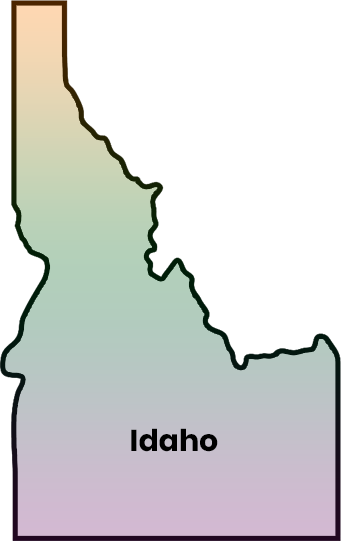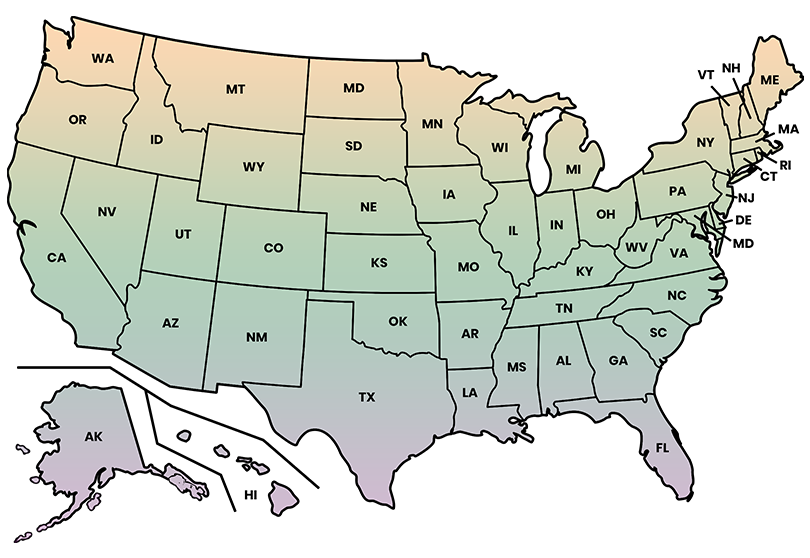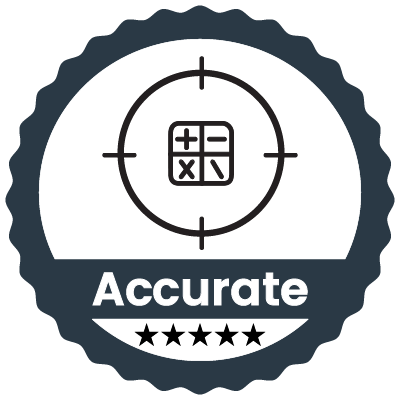Before distributing pay stubs to employees and contractors in Idaho, it's essential to be well-versed in the state's regulations and laws governing payroll operations.
This guide elucidates the pertinent laws and regulations that employers in Idaho need to understand when it comes to payroll management and providing pay stubs.

Pay stub regulations in Idaho
1. Are pay stubs required by law in Idaho?
Employers in Idaho must provide their employees with pay stubs every payday.
2. How often do you need a pay stub in Idaho?
You will need to pay your employees regularly on a schedule. As pay stubs are mandatory in Idaho, you will need to provide pay stubs every time you pay your employees.
3. What information can be included on a pay stub in Idaho?
The following information can be included in employee pay stubs:
- Employee information such as name, last 4 digits of social security number, and address
- Employer information such as name, employer identification number (EIN), and address
- The number of regular and overtime hours worked
- Rate of pay
- Gross wages
- Deductions for taxes
- Other deductions authorized by employees
- Beginning and ending dates of the pay period
4. Does Idaho have a state income tax?
Yes, state income taxes are applicable to employees in the state of Idaho.
5. Are there any other taxes applicable to Idaho?
No. There are no local taxes in the state of Idaho.
Information needed to generate pay stubs
To provide employees with accurate pay stubs, the information below is required.
- Employee’s exemption status from state withholding
- Filing status, total allowances, and additional state withholding amount.
Idaho wage and hour laws
In Idaho, employers are required to follow wage and hour laws ensuring that non-exempt workers receive fair compensation, including at least minimum wage, proper payment for overtime hours, adequate meal and rest breaks, and the accrual of appropriate paid time-off benefits.
In Idaho, these regulations encompass various aspects of employment law.
Idaho Minimum wage
Businesses in Idaho are mandated by law to ensure that their employees receive at least the minimum hourly wage as specified by statutory regulations.
As of 2025, the basic Minimum wage Rate per hour is $7.25.
Overtime pay
According to federal regulations, unless otherwise specified, employers are prohibited from scheduling employees to work more than 40 hours in a single workweek, which comprises seven consecutive 24-hour periods. If employees work beyond this threshold, they must be compensated at a rate not less than 1.5 times their regular pay rate. A workweek can start on any day and at any hour determined by the employer. Each workweek is considered independently for overtime payment purposes; averaging across multiple workweeks is not permitted.
Idaho meal and rest break
In Idaho, employers are not legally required to provide meal breaks and rest breaks for their employees.
Paid time off and leave
In Idaho, employers are obligated to offer employees a range of leave benefits, including both mandatory and discretionary options.
| Required Leave | Non-Required leave |
|---|---|
| Unpaid | Paid or Unpaid |
| Employers may have an obligation to offer employees unpaid leave as stipulated by the federal Family and Medical Leave Act. | Vacation leave |
| Jury duty leave | Bereavement leave |
| Military leave | Holiday leave |
| Sick leave | |
| Voting leave |
Idaho State payroll taxes 2025
In Idaho, payroll taxes are classified into the following categories:
- Idaho Personal Income Tax (PIT)
- Idaho State Unemployment Insurance (UI) Tax
Idaho Personal Income Tax (PIT)
In Idaho, state personal income tax rates fluctuate based on an individual's filing status and income level, with filing statuses comprising Single, Married Filing Separately, Married Filing Jointly, and Head of Household.
In 2024, the income tax rate on Idaho taxable income is 5.695%.
Tax Rate Based on Taxable Income for Single Filers in 2024
| At least | No more than | Tax rate |
| $1 | $4,673 | 0.0% |
| $4,673 | 5.695% |
Tax Rate Based on Taxable Income for Married Filers in 2024
| At least | No more than | Tax rate |
| $1 | $9,346 | 0.0% |
| $9,346 | 5.695% |
Idaho State Unemployment Insurance (UI) Tax
Idaho established the State Unemployment Tax Act (SUTA) to support individuals facing unemployment by providing them with unemployment benefits. This legislation enables the state to collect the required funds to administer unemployment insurance benefits to eligible individuals during job loss.
In 2025, SUTA rates in Idaho span from 0.225% to 5.400%, with a standard rate set at 1.000%. Additionally, the taxable wage base for the year is $55,300
Idaho payroll tax filing
- Report of New hire Employees
- Report of Independent Contractors
- Idaho personal income tax filing (Form 40)
- Quarterly Tax Reporting (Online Reporting & Form TX20/TX26)
Report of New hire Employees
Idaho employers must adhere to the state's new hire reporting law, which mandates the submission of new employee information to the Idaho Department of Labor within 20 days from their start date. Additionally, this requirement extends to rehired employees, provided their previous employment ended at least 60 days before their rehire date.
Report of Independent Contractors
Idaho employers are not required to report the hiring of independent contractors under the state's new hire reporting law.
How to report employees new hire in Idaho?
Submitting new hire information in Idaho offers several options, granting flexibility in the reporting process.
| Online | Fax | |
|---|---|---|
| Employees New Hire Report | Address Information: 317 W. Main St. Boise, ID 83735 Direct Phone: 208-332-8941 Public Phone: 800-627-3880 Email: newhire@labor.idaho.gov | Fax 1: 208-332-7411 |
Idaho personal income tax filing (Form 40)
For Idaho personal income tax filing, submit your tax return and pay any taxes owed by April 15, 2025, for the 2024 calendar year using Form 40.
Quarterly Tax Reporting (Online Reporting & Form TX20/TX26)
Employers must adhere to quarterly reporting and payment of unemployment insurance taxes. Reports and payments should be made by the last day of the month following the end of each calendar quarter (e.g., the quarter encompassing January, February, and March is due by April 30). There is no grace period, and if the deadline falls on a weekend or holiday, the next workday is considered the due date. Late filing may result in a penalty. All employers are mandated to file online through labor.idaho.gov/e-services, where they can create or access their Employer Portal account. If opting for paper forms (TX20, TX26), employers must submit a written request explaining their inability to comply with online reporting.
| Reporting Period | Due Date |
|---|---|
| Quarter 1 | April 30 |
| Quarter 2 | July 31 |
| Quarter 3 | October 31 |
| Quarter 4 | January 31 |
Have all the information handy?
With SecurePayStubs, you can calculate accurate federal and Idaho state taxes for your employees and generate pay stubs securely.
Processing payroll manually is complex
As a business owner who runs payroll manually, you will need to keep up with ever-changing payroll laws. You already have a lot on your plate and you might not want to get into the complex process of pay stub generation.
Using SecurePayStubs' paystub generator, you can swiftly create pay stubs for both employees, complete with precise federal and Idaho state tax calculations, and independent contractors, all within minutes—less than 2 minutes. Enter the basic employee and employer information, select a pay stub template for free, and let SecurePayStubs calculate the applicable payroll taxes accurately.
Spend less time generating pay stubs and more on your business growth.
This article has been updated from its original publication date of March 12, 2025.




